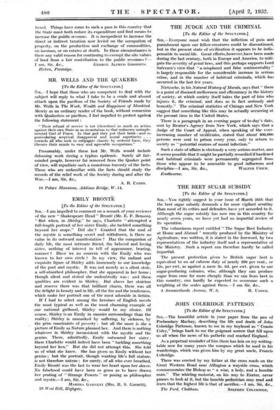THE JUDGE AND THE CRIMINAL [To the Editor of the
Sesc-rston..]
Sut,—Everyone must wish that the infliction of pain and punishment upon our fellow-creatures could be discontinued, but in the present. state of civilization it appears to be indis- pensable to social life. Great efforts, however, have been made during the last century, both in Europe and America, to miti- gate the severity of penal laws, and this perhaps supports Lord Salvesen's view that " a misplaced- and false sentimentality " is largely responsible for the considerable increase in serious crime, and in the number of habitual criminals, which has occurred in the last few years.
Nietzsche, in his Natural History of Morals, says that there is a point of diseased mellowness and effeminacy in the history of society, at which society itself takes the part of him who injures it, the criminal, and does so in fact seriously and honestly." The criminal statistics of Chicago and New York suggest that something like this may be actually occurring at the present time in the United States.
There is a paragraph in an evening paper of to-day's date. sent by Reuter's Agency from New York, which says that a Judge of the Court of Appeal, when speaking of the ever- increasing, number of ricidivistes, stated that about 400,000 persons were sent to prison every year, only to return to society as " potential centres of moral infection."
Snell a state of affairs is obviously a very serious matter, anal it seems possible that it might be partially remedied if hardened and habitual criminals were permanently segregated from those who appear to be amenable to good influences and
































 Previous page
Previous page